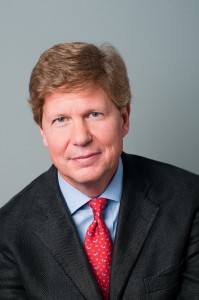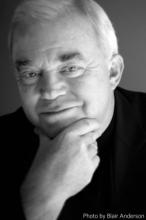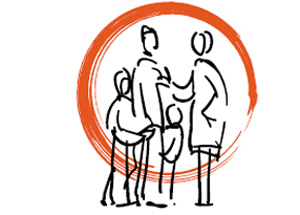Liberal
In our own time the "jobs" rhetoric from both the right and the left ignores the power grabs and power differentials that led to the hemorrhaging of American jobs in the first place. The simple truth is that multinational corporations could make more money for their shareholders by outsourcing jobs to third-world countries so that is what they did.
This was not a moral dilemma for CEOs; it was a "sound business decision." And the gospel according to free-market capitalism (the USA's true religion) preaches that what is good for American business is good for America.
Tavis Smiley and Cornel West on poverty. The Value Voters Summit. U.S. Catholic Bishops remind Catholic voters about church teaching. Perry supporter calls Mormonism a "cult." Ron Paul wins Value Voter straw poll, with Cain in second place. Mitt Romney and religious bigotry. Ghana church says poverty "causes" homosexuality. Fox News attacks Lily the new Sesame Street poverty Muppet as "liberal bull." And Newt Gingrich says candidates are "not running for theologian-in-chief."
 The puzzle here is not that readers of the Bible would tilt toward the political left. That, for me, as well as for thousands of other American evangelicals, is self-evident. Jesus, after all, summoned his followers to be peacemakers, to turn the other cheek, to welcome the stranger and to care for “the least of these.” He also expressed concern for the tiniest sparrow, a sentiment that should find some resonance in our environmental policies.
The puzzle here is not that readers of the Bible would tilt toward the political left. That, for me, as well as for thousands of other American evangelicals, is self-evident. Jesus, after all, summoned his followers to be peacemakers, to turn the other cheek, to welcome the stranger and to care for “the least of these.” He also expressed concern for the tiniest sparrow, a sentiment that should find some resonance in our environmental policies.
No, the real conundrum lies in the subtitle the editors of Christianity Today assigned to Franzen’s article, which was titled, “A Left-Leaning Text.” Adjacent to a picture of a Bible tilted about 45 degrees to the left, the editors added the subtitle: “Survey Surprise: Frequent Bible reading can turn you liberal (in some ways).”
The fact that anyone should register surprise that the Bible points toward the left should be the biggest surprise of all.

Here we go again. Presidential elections are coming and the role of "the evangelicals" is predictably becoming a hot political story.
Ironically, voices on both the right and the left want to describe most or all evangelicals as zealous members of the ultra-conservative political base.
Why? Perhaps because some conservative Republicans want to claim a religious legitimacy and constituency for their ideological agenda, and some liberal writers seem hell-bent on portraying religious people as intellectually-flawed right-wing crazies with dangerous plans for the country.
Let me try to be clear as someone who is part of a faith community that is, once again, being misrepresented, manipulated, and maligned. Most people believe me to be a progressive political voice in America. And I am an evangelical Christian.
I believe in one God, the centrality and Lordship of God's son Jesus Christ, the power of the Holy Spirit, the authority of the scriptures, the saving death of the crucified Christ and his bodily resurrection -- not as a metaphor but a historical event. Yep, the whole nine yards.
When President Barack Obama laid out his deficit plan Monday, he wasn't just trying to sell a policy. When he pressed for tax hikes on the rich and announced, "This is not class warfare," he was trying to exorcise a demon that has bedeviled the Democratic Party for decades and in the process deprive the Republicans of one of their trustiest weapons. The reaction from the right was swift and sure: "Class warfare!"
A week or two after the 2004 election, I was dining with some friends in New York when the conversation turned to religion and politics -- the two things that you're never supposed to discuss in polite company.
George W. Bush had just been re-elected with the help of what was described in the media as "evangelical voters." And knowing that I am an evangelical Christian, my friends were terribly curious.
"What, exactly, is an evangelical?" one gentleman asked, as if he were inquiring about my time living among the lowland gorillas of Cameroon.
I suddenly found myself as cultural translator for the evangelical mind.
"As I understand it," I began, "what 'evangelical' really means is that a person believes in Jesus Christ, has a personal relationship with him and because of that relationship feels compelled to share their experience of God's love with other people. "How they choose to share that 'good news' with others is entirely up to the individual. Beyond that, the rest is details and style."
Shakespeare said a rose by any other name would smell as sweet. Maybe, but a Stink Rose by any other name (say... garlic?) might get more play.
On July 19, Campus Crusade for Christ announced its plan to officially change its name to Cru in early 2012.
Brown v. Board of Education had not yet been fought in the Supreme Court when Bill and Vonetta Bright christened their evangelical campus-based ministry Campus Crusade for Christ in 1951. The evangelical church context was overwhelmingly white, middle class, and suburban. The nation and the church had not yet been pressed to look its racist past and present in the face. The world had not yet been rocked by the international fall of colonialism, the rise of the Civil Rights movement, the disillusionment of the Vietnam War, the burnt bras of the women's liberation movement, the fall of the Berlin Wall, or the rise of the Black middle class (more African Americans now live in the suburbs than in inner cities). In short, theirs was not the world we live in today. So, the name Campus Crusade for Christ smelled sweet. Over the past 20 years, though, it has become a Stink Rose ... warding off many who might otherwise have come near.
After months of good-faith reforms and patience, the drama is back in Egypt's Tahrir Square as protesters are preparing for a potential showdown with the state's military rule. The movement, among other things, is demanding an end to military rule -- a more radical call that reflects both the frustration with the status quo and the hope for a better way.
Two weeks ago, at the "Day of Persistence," Egypt saw its largest resurgence of public protest since former President Hosni Mubarak was ousted in February. The nation-wide protests show Egyptians camping out in Cairo's Tahrir Square, staging sit-ins and blocking traffic in Alexandria, and threatening to shut down Suez's tunnel access to Sinai. So why are the people confronting -- albeit nonviolently -- an interim government that has promised elections and a new constitution? A glance at the collective demands drafted in Tahrir Square make clear that the movement's demands -- both political and economic -- have not progressed much under the military rule of the Supreme Council of the Armed Forces.
 Several weeks ago (right before I left for my sabbatical), I joined with six other pastors from around the country -- in partnership with Sojourners -- to draft an open letter to Congress and President Barack Obama regarding the budget and the proposals to cut certain programs that aid the poor in our country. Our hope was to invite at least 1,000 pastors to join us in signing this document.
Several weeks ago (right before I left for my sabbatical), I joined with six other pastors from around the country -- in partnership with Sojourners -- to draft an open letter to Congress and President Barack Obama regarding the budget and the proposals to cut certain programs that aid the poor in our country. Our hope was to invite at least 1,000 pastors to join us in signing this document.
As of today, we've had nearly 5,000 pastors and Christian leaders from all 50 states join us in signing this open letter, and we hope to keep adding voices and signatures. As a pastor and Christian leader will you add your voice to let our political leaders know that you stand with the poor?
Read the letter below and if you resonate with our message, please sign your name.
The Public Religion Research Institute recently released the results of their newest survey, "Committed to Availability, Conflicted About Morality," which shined new light on the complexity of opinions on abortion between different religious groups and age demographics. The study results were presented two weeks ago at the Brookings Institution in Washington, D.C.
The most intriguing age group in the study are Millenials, ages 18 to 29. In the introduction to the survey results, the authors claim that given Millenials' self-described characteristics of being "confident, self-expressive, liberal, upbeat, and open to change," they have a "peculiar profile" when it comes to their views on abortion. And this is especially "peculiar" when viewed alongside their strong support for gender equality and rights for gay and lesbian people. Millenials' complex, label-defying views of abortion make them "conflicted about morality," the report states. But are Millenials really, actually conflicted about morality?
With all the angst about the economy, the deficit, and a looming government shut-down, I'm still concerned that we're treating symptoms rather than diagnosing the underlying disease.
I know something about this. I spent a week in the hospital last year having loads of tests done -- blood work, heart scans, stress tests, and sonograms. I was discharged without a diagnosis, merely with hopes that by treating the symptoms, whatever was wrong would go away. It didn't. It turned out my real problem was a tick-born disease, and once it was diagnosed, a ten-dollar prescription of antibiotics cured me. Without that ten-dollar prescription to treat the real problem, I could have experienced life-long disability.
Thanks to Sojourners supporters and our partners, there is a full page ad in Politico today asking Congress, "What Would Jesus
In light of an unsuccessful campaign to become the president of my middle school as an eighth grader, I have no plans on entering politics and running for political office.